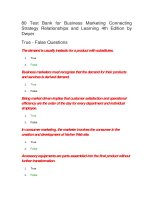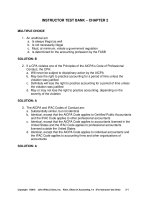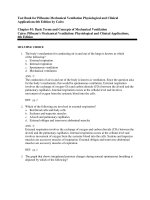Test bank for ethics in accounting a decision making approach 1st edition by gordon klein
Bạn đang xem bản rút gọn của tài liệu. Xem và tải ngay bản đầy đủ của tài liệu tại đây (277.02 KB, 6 trang )
Test Bank for Ethics in Accounting A Decision Making Approach 1st Edition
by Gordon Klein
MULTIPLE CHOICE
1. A focus on the importance of categorical imperatives distinguishes:
a. Utilitarianism from consequentialism
b. Deontology from utilitarianism
c. The philosophies espoused by Kant from deontology
d. The philosophies espoused by Mill from utilitarianism
SOLUTION: B
2. A focus on achieving the least overall harm for members of society is best
reflected in the philosophy of:
a. Deontology
b. Consequentialism, but not necessarily utilitarianism
c. Utilitarianism, but not necessarily consequentialism
d. Emanuel Kant
SOLUTION: C
3. A real-world difficulty of applying utilitarianism is that:
a. It can be difficult to identify all stakeholders affected by a decision
b. It can be difficult to measure utility
c. Some benefits, such as the enjoyment of privacy, are difficult to quantify
d. All of the above
SOLUTION: D
Klein, Ethics in Accounting, 1/e
3-1
4. Which of the following typically is not a real-world difficulty of applying
utilitarianism?
a. It give undeservedly high weight to human emotion
b. It cannot readily measure societal values, such as the value of eradicating
discrimination based on religion
c. It can be difficult to determine if an act makes society better off
d. It focuses on the good of the majority and does not place any value on the
protection of minorities’ rights
SOLUTION: A
5. Which of the following best describes deontology?
a. It has few, if any, protections for cultural minorities
b. It often conflicts with important rights, such as freedom of contract
c. The set of rights protected by this philosophy are ill-defined
d. It favors the rights of broader society over the rights of individuals
SOLUTION: C
6. Which of the following rights customarily is not given absolute protection by
deontology?
a. Property rights
b. The right to never be imprisoned
c. The right of free association
d. The right to be left alone
SOLUTION: B
7. A real-world difficulty of applying deontology is that:
a. It can be difficult to identify all stakeholders affected by a decision
b. It can be difficult to measure utility
c. Some benefits, such as the right to the protection of trade secrets, are difficult
to quantify
d. Two or more rights protected by deontology sometimes are in conflict
SOLUTION: D
8. The principal proponent of deontology was:
a. John Stuart Mill
b. Emanuel Kant
c. Jeremy Bentham
d. Aristotle
SOLUTION: B
9. The law of eminent domain allows a local government to take a person’s property
for public use, such as building a freeway that has been designed to cross land
Klein, Ethics in Accounting, 1/e
3-2
owned by this landowner. The landowner, by law, is entitled to be paid the fair
market value of her land. The law of eminent domain is an example of:
a. Utilitarianism
b. Deontology
c. Ethical relativism
d. Ethical absolutism
SOLUTION: A
10. The law of eminent domain allows a local government to take a person’s property
for public use, such as building a freeway that has been designed to cross land
owned by this landowner. The landowner, by law, is entitled to be paid the fair
market value of her land. However, in a recent action, a local government took a
landowner’s property under eminent domain and paid that landowner less than fair
market value. Under utilitarianism, this government’s action:
a. Definitely was suboptimal
b. Definitely was optimal because the government saved money for the benefit
of society
c. Definitely was optimal because any act that shifts resources away from a
private individual to broader society satisfies the precepts of utilitarianism
d. May have been optimal or suboptimal, but further inquiry into relevant facts is
needed
SOLUTION: D
11. When a person is asked to evaluate an ethical dilemma in a secondary language
rather than in the primary language learned at birth, researchers have discovered
that the person’s decision-making tends to be:
a. Less rational
b. Skewed in favor of a choice that reflects the viewpoint of consequentialism
c. More likely to favor the deontology viewpoint
d. Emotionally-driven, especially among men
SOLUTION: B
12. Stealing from the rich to give to the poor:
a. Definitely violates the precepts of deontology
Klein, Ethics in Accounting, 1/e
3-3
b. Definitely violates the precepts of consequentialism
c. Is a categorical imperative
d. Is a classic example of the reversibility principle
SOLUTION: A
ESSAYS/SHORT ANSWERS
1. Identify an ethical issue that is in the news. Analyze it from the standpoint of
consequentialism.
2. A cheese manufacturing plant utilizes portions of milk in the cheese-making process
and sends the remainder of the milk into a nearby river. The milk effluence pollutes
the river, making it unusable for recreational use by local residents. This effluence
has a foul odor, but it does not pose a health hazard.
a. Evaluate the company’s actions from a utilitarian perspective.
b. Evaluate the company’s actions from a deontological perspective.
c. What are the practical problems in applying consequentialism in this
situation?
d. What are the practical problems in applying deontology in this situation?
SOLUTION:
Regarding utilitarianism/consequentialism: The relative utility of being free from foul
odors and the relative joy from enjoying the recreational use of a river are difficult to
measure. Similarly, the relative benefit of having abundant, affordable cheese products
is also difficult to measure. Identification of the relevant stakeholders is likewise
challenging.
Regarding deontology: Deontology views property rights as a categorical imperative.
In this case, the property rights of the cheese manufacturer conflict with the rights of
local residents to be free from the physical intrusion caused by the foul odor.
Klein, Ethics in Accounting, 1/e
3-4
3. A student at a local elementary school recently returned from a trip to a region of the
world where there is a plague of a dreaded disease called the “Crazy Curse.”
According to medical doctors, the odds of this student infecting fellow classmates
with this disease are “lower than zero.” However, many parents have asked the
school to disclose whether this student did in fact travel to the region where the
“Crazy Curse” is spreading rapidly.
School authorities know that, if they make such a disclosure, the student will be
ostracized and many parents will refuse to send their children to school. As a result,
the school is considering various options, including making an announcement that
“the student in question did not travel” to the region where the Crazy Curse is
spreading.
a. What actions should the school consider?
b. What action do you recommend?
c. Is your decision consistent with deontology?
d. Is your decision consistent with consequentialism?
SOLUTION: Deontology precludes ever lying, even if the ends arguably seem to justify
the means. Consequentialism must take into account all benefits and costs, including
reputational harm and the loss of credibility regarding all future pronouncements and
warnings that will occur in the future if the school is caught lying in the future.
4. Your client told you that it needed to have “a completed compilation of its financial
statements, in good form” for presentation to its bank this upcoming Friday in order
to obtain a needed working capital loan. Although you had promised to accomplish
this task on time, you were arrested for drunk driving on Thursday and had to spend
most of the day at the police station arranging to post bail.
You knew that, if you had told your client the truth, the client would have terminated
your professional relationship. This in turn would have required you to layoff Garza,
your superb accounting analyst who is financially responsible for the care of her
aged parents. As a result, you told the client that your child had to go to the
emergency room for stitches after she inadvertently sat on the sharp point of
scissors while working on an art project. Your client relayed this excuse to the bank
as the reason that the submission of its financial statements would be delayed.
a. Evaluate your conduct from the standpoint of deontology.
b. Evaluate your client’s statements to the bank from the standpoint of
deontology.
c. Evaluate your conduct from the standpoint of consequentialism.
SOLUTION: Your lie violated deontology. The bank merely relayed your excuse and
was not intentionally or knowingly deceiving the bank, so it did not violate deontology.
Klein, Ethics in Accounting, 1/e
3-5
Perhaps the preservation of jobs at your firm exceeded the harm caused by lying. Thus,
a consequentialist might contend that your actions were acceptable.
5. A poor family went to the market to purchase fried chicken for dinner tonight.
Unfortunately, this family’s beloved cat ran into the street and was killed by a
passing car. Rather than bury the cat, the family decided to cook the cat and eat it
for dinner instead of eating fried chicken. Was the family’s decision unethical?
SOLUTION: Under consequentialism, the family is better off because it saved money.
Also, by eating the dead cat and not eating the chicken, it saved the life of one chicken,
all else equal. There does not appear to be any stakeholders who were made materially
worse off.
Eating a dead cat, although disgusting to many, does not appear to violate any of
deontology’s categorical imperatives. Perhaps some will say that it violates the dignity of
the cat or of all animals generally, and therefore, offends human dignity.
More download links:
ethics in accounting a decision-making approach test bank
ethics in accounting a decision-making approach solution manual
ethics in accounting a decision-making approach pdf
ethics in accounting a decision making approach klein pdf
ethics in accounting klein pdf
ethics in accounting: a decision-making approach by gordon klein
ethics in accounting a decision making approach ebook
ethics in accounting a decision making approach klein gordon 1st edition
ethics in accounting a decision making approach 2016
Klein, Ethics in Accounting, 1/e
3-6









